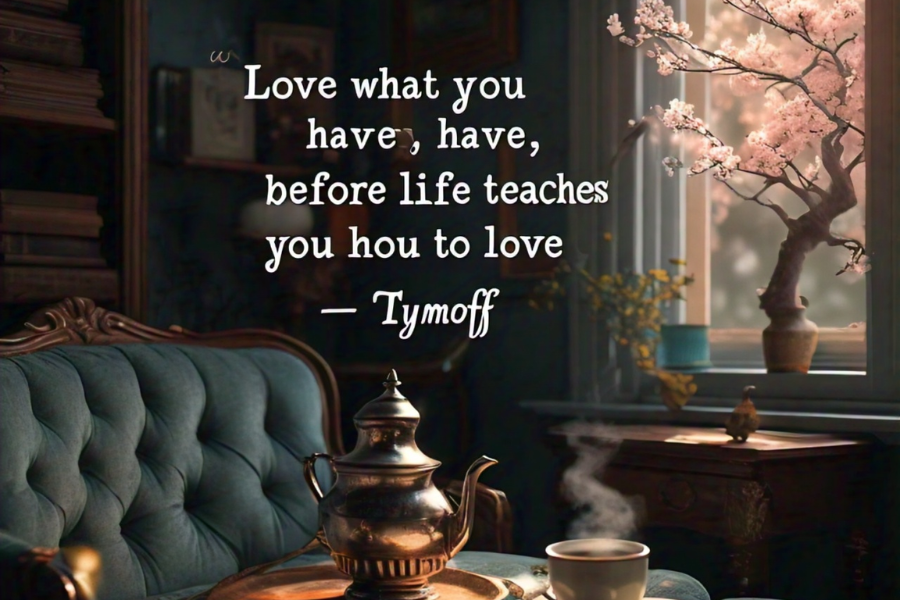Embracing Gratitude: The Philosophy of “Love What You Have, Before Life Teaches You to Love” by Tymoff
Introduction
In the present speedy world, where the quest for all the more frequently eclipses appreciation, the way of thinking of “Affection what you have, before life trains you to cherish” by Tymoff offers a significant point of view. This way of thinking urges us to see the value in the current second and treasure what we as of now have, as opposed to trusting that misfortune will show us appreciation. In this article, we dig into the beginnings, importance, and useful utilizations of this ageless way of thinking.
Origin and Meaning
Ascribed to the cutting edge rationalist Tymoff, the assertion “Love what you have, before life trains you to cherish” highlights the significance of appreciation and happiness. It proposes that life’s difficulties can act as brutal illustrations in valuing what we frequently underestimate. By embracing appreciation proactively, we can develop a seriously satisfying and improving valuable experience.
Living Appreciatively
At its center, Tymoff’s way of thinking advocates for a way of life of appreciation. It urges us to track down euphoria in both the unprecedented and commonplace parts of life, encouraging strength and satisfaction through appreciation. This point of view welcomes us to perceive the innate worth in our connections, wellbeing, amazing open doors, and ordinary delights.
Interpretation from Various Perspectives
While Tymoff is frequently credited with this understanding, comparable opinions resound across different social and philosophical customs. This all inclusiveness features the ageless truth that valuing what we have is basic to human prosperity and satisfaction.
Personal Application
The way of thinking prompts reflection on what comprises “having” in our singular lives. How would we offer love and thanks for the one of a kind components that shape our reality? This individual reflection encourages a more profound comprehension of the way of thinking’s importance on a singular level.
Potential Criticisms
Pundits might contend that the way of thinking distorts life’s intricacies. They could fight that self-awareness and reflection, not simply difficulty, add to creating appreciation. Besides, financial aberrations can influence one’s capacity to develop love and appreciation for life’s favors.
Acknowledging Individual Circumstances
Perceiving the changed conditions individuals face is essential. The way of thinking’s relevance might fluctuate in light of individual encounters and difficulties people experience. Moving toward the message with sympathy recognizes alternate points of view on life’s excursion.
Overall Takeaway
At last, Tymoff’s way of thinking fills in as a piercing suggestion to esteem the current second and effectively value what we have. Its effect isn’t widespread, however profoundly private, impacted by individual settings and encounters.
Cultivating Gratitude
Encouraging appreciation arises as an integral asset for upgrading prosperity. By deliberately valuing the up-sides in our lives, people can explore difficulties with strength and satisfaction.
Additional Insights on Tymoff and the Quote
However Tymoff is frequently connected with this critical assertion, its exact beginnings stay muddled. Comparable feelings reverberate across different social and philosophical lessons, highlighting a common human comprehension of the significance of appreciation and appreciation.
Online Traction
This way of thinking has accumulated a foothold in computerized discussions about appreciation, care, and the craft of enjoying valuable experiences. Its prevalence highlights its reverberation in the computerized age.
What We Can Learn from Losing What We Have
This way of thinking trains us to expect surprising difficulties that life presents. These difficulties urge us to face our weakness and delicacy. Through these encounters, we figure out how to esteem and value what we recently underestimated.
Embracing Relationships
The way of thinking accentuates the meaning of valuing and sustaining the connections in our lives. It features the significance of appreciating and esteeming the adoration these associations bring. Contributing time can make areas of strength for our connections.
Facts:
Origin: The philosophy is often attributed to the modern philosopher Tymoff, although the exact origins of the statement remain unclear.
Meaning: It emphasizes the importance of gratitude and contentment in life, suggesting that challenges and adversity can teach us to appreciate what we have.
Universal Resonance: Similar sentiments are found across various cultural and philosophical traditions, highlighting its timeless relevance.
Online Presence: The philosophy has gained traction in digital discussions about gratitude, mindfulness, and the art of appreciating life’s blessings.
Summary:
“Tymoff’s philosophy encourages embracing the present moment and cherishing what one already possesses, rather than waiting for adversity to teach gratitude. It promotes a lifestyle of appreciation, finding joy in both extraordinary and everyday aspects of life. This philosophy underscores the value of relationships, health, opportunities, and simple pleasures as essential components of a fulfilling life.”
FAQs:
Q1: Who is Tymoff?
Tymoff is a modern philosopher often credited with the statement “Love what you have, before life teaches you to love.” His exact identity and background are not widely documented.
Q2: What does “Love What You Have, Before Life Teaches You to Love” mean?
This statement encourages people to value and appreciate their current circumstances and relationships actively. It suggests that life’s challenges can teach us the importance of gratitude and contentment.
Q3: How can I apply Tymoff’s philosophy in my life?
Practice gratitude daily by reflecting on what you are thankful for. Embrace mindfulness to appreciate the present moment and foster stronger relationships by expressing appreciation for loved ones.
Q4: Why is gratitude important according to Tymoff?
Tymoff believes that gratitude enhances mental well-being, fosters resilience, and promotes a deeper appreciation for life’s blessings, leading to a more fulfilling existence.
Q5: Where can I learn more about Tymoff and his philosophy?
While Tymoff’s background may be obscure, exploring various philosophical and cultural texts on gratitude and mindfulness can provide deeper insights into similar teachings.







